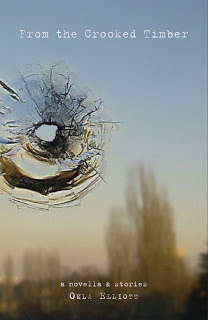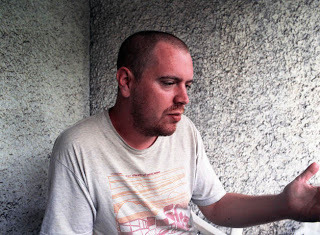Guest blogger: Okla Elliott

Editor's Note: Okla Elliott's book, From the Crooked Timber, a novella and stories, was recently published by Press 53. I asked him to tell us a little something about the book.Okla Elliott:
I have beenasked to offer a brief and informal discussion of "The Names of DistantGalaxies," the novella in my short fiction collection From the Crooked Timber. First off, let me thank Clifford Garstangfor that generous offer. Mr. Garstang is a first-rate practitioner of the shortfiction form and a champion of literature, so I was honored when he asked me todo this little piece.
"The Names ofDistant Galaxies" started as a novel with chapters alternating between thenarrator as a boy and his stepmother when she was his age, which was when herneurological disorder, dystonia, set in. The chapters which were focused on thenarrator were in first-person and those on his stepmother were in third-, withthe idea being that as an adult he was looking back on it all, remembering hisown childhood and imagining hers. This got a bit too programmatic, and thestyle came to feel too much like a lot of southern/rural novels I'd read. Then,some friends pointed out to me how there was this strain in the novel that soundedlike an outside commentator's voice, but still somehow the voice of thenarrator, just very distant and unnatural. I started writing randomly in thisvoice and realized it was the voice of the narrator trying to figure out how totell his story.
So then I made the not very large leap over to having him do exactlythat—struggle with writing this story he had no idea how to tell. So then therewere these meta-sections, where he would talk about his current life and theprocess of writing (and all the troubles he was having with that process).Those sections are as close to my natural talking voice as I could get withoutlosing artistry, so that the reader feels like this is a conversation, but thenthe sections he writes as part of his novel/memoir are much more "literary"—mypoint being, in a way, that we stylize our stories pretty radically, and eventhe intermediary sections that are meant to be in a raw voice are stylized,just differently, in a way meant to mimic my own natural speech (which is itselfstylized), and so on. In effect, I wanted to have a few kinds of cake and eatthem all. I wanted to write a more traditional literary narrative, and I wantedto mess with the form a bit as well. I have been trying to find a proverbial "thirdway" between so-called traditional and so-called experimental writing for along time, and so I have my narrator write an incomplete novel in thetraditional psychological-realist style, while I wrote a novella that makes useof various meta-techniques. My issue with a lot of "traditional" writing isthat it seems to want to pretend that the 20th century neverhappened in terms of literary innovations, and my issue with "experimental"writing is that it too often misses what I think the point of literature tobe—namely, to understand better what it means to be human. So, as I say, Itried to find a third way and eat all the cake I could get my hands on, as itwere.
This process was less than efficient, in a way. To get what turned out to beabout 80 pages in manuscript form, I wrote over 230 pages and re-envisioned itseveral times. I've loved the novella form for a long time and think it's theperfect genre in many ways—long enough to engage with big stories yet shortenough to read in one day—so I am happy to have dedicated so much energy tothat piece. I plan on writing more novellas and hope to see a kind renaissancein the form, now that so many small presses are getting more interested in themand with the advent of the Kindle/Nook reading technologies.
 Okla Elliot is currently the Illinois Distinguished Fellow at the University of Illinois, where he works in the fields of comparative literature and trauma studies. He also holds an MFA from Ohio State University. For the academic year 2008-09, he was a visiting assistant professor at Ohio Wesleyan University. His drama, non-fiction, poetry, short fiction, and translations have appeared in Another Chicago Magazine, Indiana Review, The Literary Review, Natural Bridge, New Letters, A Public Space, and The Southeast Review, among others. He is the author of three poetry chapbooks--The Mutable Wheel; Lucid Bodies and Other Poems; and A Vulgar Geography--and he co-edited (with Kyle Minor) The Other Chekhov.
Okla Elliot is currently the Illinois Distinguished Fellow at the University of Illinois, where he works in the fields of comparative literature and trauma studies. He also holds an MFA from Ohio State University. For the academic year 2008-09, he was a visiting assistant professor at Ohio Wesleyan University. His drama, non-fiction, poetry, short fiction, and translations have appeared in Another Chicago Magazine, Indiana Review, The Literary Review, Natural Bridge, New Letters, A Public Space, and The Southeast Review, among others. He is the author of three poetry chapbooks--The Mutable Wheel; Lucid Bodies and Other Poems; and A Vulgar Geography--and he co-edited (with Kyle Minor) The Other Chekhov.
Published on December 26, 2011 05:09
No comments have been added yet.



